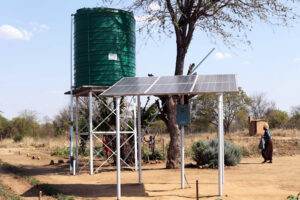Climate change-hit farmers modelling sustainable farming in Zimbabwe
Work funded by the UK public, and match funded by the UK government has boosted the income of smallholder farmers in Zimbabwe, helping them to double their food production and increase their income. The farmers have only small plots of land and live a subsistence lifestyle.
The Planting for Progress(P4P) programme has worked with thousands of women farmers in some of the driest parts of Zimbabwe, in the districts of Gwanda and Bulilima throughout the Covid pandemic.
The farmers have adopted solar-powered irrigation in their nutrition gardens and sand dams to store precious water. Many also adopted chickens, used new seed varieties better adapted to the local weather conditions and new regenerative farming methods.

An example of the solar panel used to power the solar gardens
The result is that many families with small farms in the area have doubled their food production.
Over the last three years the project has:
- Benefited nearly 6500 people from over 1000 households that participated in the project.
- Reached over 1200 farmers despite the impact of the Covid-19 pandemic.
- Established 14 irrigation gardens, 7 per district in the project implementation area.
- 6 of the irrigation gardens draw water from boreholes and 1 draws water from a river.
- Constructed 2 sand dams to improve the storage of precious water.
- Established 12 solar-powered egg incubators to improve chicken rearing and adoption.
- Shared knowledge through the training of the farmers in various sustainable farming methods, marketing their produce and prudent financial management.
- As at the close of the project all the solar gardens had produced and started selling crops such as cabbages, rape, carrots, chou mollier and onions. This is bringing income to the farmers and sustaining their livelihoods.
- The farmers are also efficiently managing post-harvest losses through practices taught during the implementation phase of the project.
- Established a mechanism for sustaining the project post the implementation phase. It has a 10% community contribution towards the establishment of all the project infrastructure such as borehole drilling, irrigation garden set-up, indigenous chickens, solar-powered egg incubators. This ensured community ownership to avoid installations being white elephants in the post-project era.
- Built the capacity of irrigation management committees who are tasked with monitoring and routine maintenance of boreholes and irrigation kits in all the gardens.
Akinyi Walendar, Practical Action Africa Director said “Prior to the Covid-19 pandemic, the UK public were asked to support two projects helping to turn the tables on climate change in Africa. One in Sudan and the other in Zimbabwe.
“Their generosity helped Practical Action raise over £1.48m for farmers in Zimbabwe. With this money being matched, pound for pound by the UK Government it took the grand total for this project to £3.14m. The emergence of Covid-19 presented us with a challenge, but we worked hard to ensure that our project was not derailed despite the chaos caused by the coronavirus. The impact from the money raised has been significant.
Our work has helped farmers in Zimbabwe to double their food production and improved their livelihoods. We are grateful for the support of our donors, and we hope that they continue to support us in the future so that we can continue to reap these benefits”

Members of Ukhupila Garden
The Planting for Progress(P4P) project was launched in 2019 with the aim of addressing the incidence of poor soils, low rainfall, poor agricultural practices and inefficient water storage, and preservation.
These are the key drivers of low agricultural productivity in the area. This project has helped improve food security and livelihoods among farmers in the two districts in Zimbabwe.
Progress Tlou, a beneficiary of the Madida Chicken rearing project in Gwanda District said:
“Practical Action came and taught us about chicken rearing before they gave us chickens. We always had chickens at our homes before their arrival, but I used to throw away the eggs because they get spoiled. So, to avoid this, I used to sell some of the chickens and eat the eggs.
I am happy that now with the solar powered egg incubator, it helps us with hatching more eggs, growing our chicken numbers and earns us income”
Sukoluhle Nleya, lives in Bulilima and a beneficiary of the Manake Garden project, said:
“The problem we were facing here is water, we had to travel more than 4km to get it. As of now water challenges are a thing of the past as we now have piped water. In the past we used to get water from a well, the well is manually operated but with this borehole in the irrigation scheme, it is no longer manual. We just open the taps, and this has made our lives a lot easier.
We are hoping to grow crops throughout the year, and we are being assisted to use the calendar in deciding the best crops to cultivate at a given time”
Bonang Mukwena, councillor, Ward 4, Gwanda District said:
“The construction of sand dams through the assistance of Practical Action has been helpful to the villagers of ward 24 under the Bulobelo village”
The Planting for Progress(P4P) project was supported by the UK government through UK Aid Match, a programme that matches public donations to aid projects, and was managed by Practical Action.